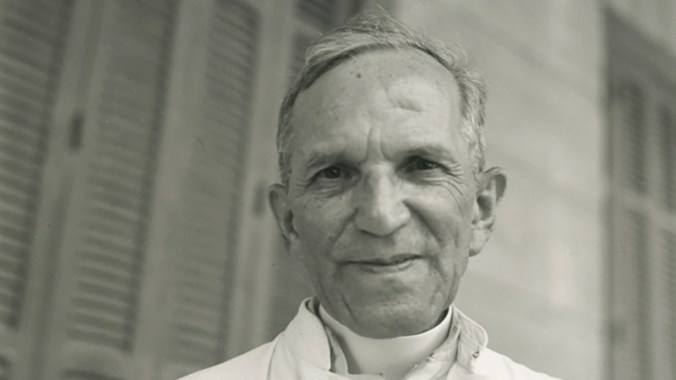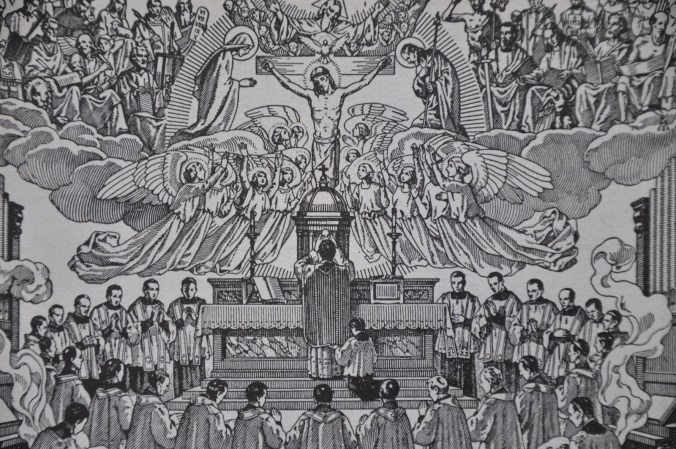
Maurice Zundel in old age. (Source)
Fr. Maurice Zundel was one of the great, if often-forgotten, theologians of the last century. Sometime student of Fr. Reginald Garrigou-Lagrange, he wrote various works of Catholic philosophy in conversation with existentialism, Protestantism, and personalism. This wide-ranging and erudite scholarship led soon-to-be-Saint Paul VI to call him “a mystical genius.” However, he is best known in the Anglophone world for his writing on the liturgy. This extract is taken from his great work, The Splendour of the Liturgy (1943), translated by Edward Watkin for Sheed & Ward. It comes from his chapter on “The Collect” (pg. 61-67). I was struck by this passage’s profound depths of wisdom as well as its light, imaginative style.
Prayer is the soul’s breath, the creature’s fiat in response to the Creator’s in that mysterious exchange which makes us God’s fellow-workers. Its purpose is not to inform God of needs which He knows infinitely better than we do ourselves, nor to move His will to satisfy them, for His will is the eternal gift of infinite Love. Its sole object is to make us more capable of receiving such a gift, to open our eyes to the light, to throw open the portals of our heart too narrow to give access to the King of glory. There is no need to importune God for our happiness, for He never ceases to will it. It is we who place the obstacle in its way and keep his love at arm’s length.
Jerusalem, how often would I have gathered thy children, as a hen gathers her chickens beneath her wings, and thou wouldst not.
This surely is the most poignant expression of the Divine Tragedy: ‘I would, I, thy Lord and thy God—but thou, thou wouldst not.’ If we place this complaint side by side with the text already quoted from the Apocalypse, ‘I stand at the door and knock,’ we must conclude that God always hears man’s prayer, that He is the eternal answer to prayer, and that it is man who too often refuses to hear God’s prayer.
And prayer is precisely the response to Love’s eternal invitation, which is made with an infinite regard for our freedom. It is, therefore, superfluous to ask whether every prayer is heard. It is heard if and in so far as it is a genuine prayer. For genuine prayer is the opening of the soul to the mysterious invasion of the Divine Presence, and it is completely summed up in the final appeal of the Apocalypse: ‘Come, Lord Jesus.’ (61-62)
Throughout the chapter, Zundel strikes what we might call a sophiological note. He approaches the most basic substance of the Christian life—prayer—and carries on to the Eschaton, to spiritual nuptials, and to illumination from on high.
It remains true that there is no conversation without answers, no marriage of love without mutual consent. And it is a marriage of love that is to be concluded between God and ourselves. In this marriage whose intimate union must continually grow until its flower unfolds in eternity, prayer is our assent. There is no need to put it into words. It may be confined to a silent adherence, a simple look in which we give our entire being a calm silence in which, without adding anything of her own, the soul listens to Him who utters Himself within her by His single Word. And all prayer tends towards this transparent passivity which exposes the diamond of our free will to the rays of the eternal light. We can pray without asking for anything and without saying anything, that God may express Himself the more freely…
It is ultimately for the sake of God that the soul desires her own Beatitude, that no obstacle may thwart His love, that the world may realise its spiritual vocation, and that throughout creation all may be yea, as all is yea in God. (62-64)
Zundel notes that the peculiar genius of the Liturgy is the way it uses human spiritual needs as launchpads for a “flight” into the eternal. The Collects crystallize this function in that they often speak of our human wants. Zundel writes:
But their very sobriety forbids us to stop at their verbal surface. The soul has but to let herself go and she is launched on the open sea voyaging over abysses of light and darkness, of sorrow and peace. They are more than prayers, they are sacraments of prayer, formulas that induce the essential prayer which we have attempted to describe. (64-65)

Would that we might be ever mindful of what is really taking place at every Mass! (Source)
Among Prayer-Book Anglicans, there used to be a very old custom of memorizing collects. I do wonder how many still keep it up—certainly, I don’t know of any Catholics who memorize collects. Imagine what would happen to our own spiritual lives, to say nothing of the Church militant, if we committed to learning a few by heart. If you’re looking for a beautiful English translation of the traditional collects, might I recommend a little volume published by W. Knott & Son. Otherwise, there’s another good alternative that came out around the same time.
Pingback: SVNDAY EDITION – Big Pulpit
Pingback: Tobit 5: Rafael | The Noontimes
Pingback: Happy New Year From The Amish Catholic! | The Amish Catholic